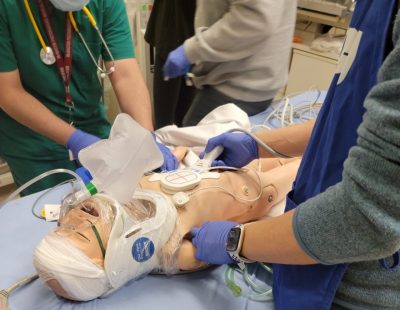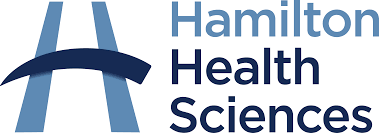
The Simulation, Resuscitation and Outreach Center (SiROC) at McMaster Children’s Hospital (MCH) provides simulation-based education, basic and advanced life support courses, and skill competencies to promote patient safety and quality of care.
Each training session is customized based on the clinical setting and target audience to create a positive, enriching, and supportive educational environment.
All healthcare providers (from inside and outside HHS) are welcome to attend our courses. Plus, our family CPR course targets parents, family members, and caregivers with limited or no medical training to prepare them for the unexpected emergency at home or in the community.
Our programs center around three key areas.
Medical Simulation & Mock Codes
The Simulation, Resuscitation and Outreach Center (SiROC) delivers simulation-based training to enhance clinical competencies, teamwork, and interdisciplinary collaboration to advance safe, high-quality care and improve health outcomes. The simulated training environment can be tailored to novice and experienced professionals and involve simple or complex cases.
Contact us for more information: outreach@hhsc.ca or 905-521-2100 ext. 73378.
Clinical Skills Lab
The Simulation, Resuscitation and Outreach Center (SiROC) clinical skills lab offers opportunities for healthcare providers to engage and practice clinical skills in small groups to advance their clinical skills and gain confidence to practice safely and competently. Lab sessions vary from core skills to communication and team-building skills.
Contact us for more information: outreach@hhsc.ca or 905-521-2100 ext. 73378.
Basic and Advanced Life Support Courses
The Simulation, Resuscitation and Outreach Center offers training and recertification courses of Heart and Stroke (HSF) Basic and Advanced Life Support (ALS) courses, plus the advanced and essential Canadian Pediatric Society Neonatal Resuscitation Program (NRP) courses for healthcare providers. We also provide training for community-based healthcare providers to equip them with essential skills needed to care for complex care patients in the community.
Why learn with us?
 Our instructor-to-participants ratio emphasizes the benefits of enhancing self-directed learning, active participation, and better communication to enhance clinical competences. |
 High fidelity interprofessional simulation provides a learning environment to master skills and enhance collaborative competences. |
 Newly introduced clinical skills lab offers opportunities to practice clinical skills and gain confidence to practice safely and competently. |
Read course descriptions and find available dates:
CPR Training for Families - HeartSaver® CPR AED
McMaster Children’s Hospital is pleased to support parents, family members, and caregivers with CPR training in order to prepare for the unexpected emergency, whether at home or in the community. We offer the Heartsaver® CPR AED course, developed and fully accredited by the Heart and Stroke Foundation of Canada.
The Heartsaver® CPR AED course focuses on developing life-saving techniques that may be needed during an unexpected emergency. During this course, participants will learn how to perform high-quality CPR and how to respond to choking emergencies. Participants will also learn how to use an Automated External Defibrillator effectively. The course is approximately 4 hours long.
Basic Life Support (BLS)
Guided by the Heart & Stroke’s 2020 Guidelines, The Basic Life Support (BLS) program offers an engaging and interactive hands-on learning experience. You will learn single and multi-rescuer basic life support skills, focusing on high-quality CPR and team dynamics in a wide variety of settings.
BLS is a prerequisite for advanced resuscitation courses and many healthcare-related training programs. Current certification is often required for employment in the healthcare field.
The BLS course is ideal for healthcare professionals and trained first responders.
We offer both the BLS Provider and the BLS Renewal Courses.
Upon successfully completing the course, participants are eligible for a BLS Provider certificate from the Heart and Stroke Foundation of Canada.
Fundamentals of Tracheostomy Care
This full-day course provides community-based health care providers with up-to-date knowledge and essential skills regarding tracheostomy management and care. Emphasizing a hands-on approach, course participants will develop skill and gain confidence in providing safe and effective care of the patient with tracheostomy, as well as practice in responding to emergency situations. This course addresses the needs of infants, children, and adults, and includes a combination of didactic lessons, skills stations, and simulation-based learning.
Management of Ventilation for Patients in the Community
Building on the knowledge and skills from the Fundamentals of Tracheostomy Care course, this full-day course aims to provide home health care providers with up-to-date knowledge and skills regarding community-based invasive and non-invasive ventilatory support. This course will cover ventilatory support of infants, children and adults, and will address essential care considerations for those who are medically fragile and technology dependent.
Course Prerequisite: Completion of Fundamentals of Tracheostomy Care course within the past 2 years.
Neonatal Resuscitation Program (NRP)
The Neonatal Resuscitation Program is an educational program that introduces the concepts and skills of neonatal resuscitation.
During our NRP courses, participants learn and work together as members of a neonatal resuscitation team.
Training in the Neonatal Resuscitation Program is a three-step process including:
(1) A self-directed learning component,
(2) Successful completion of an on-line knowledge exam, and
(3) Attendance at a day-long classroom session for hands-on skill development, practice, and testing.
Course Dates and Registration
NRP Course Materials
Mandatory Online Exam
Pediatric Advanced Life Support (PALS)
The Pediatric Advanced Life Support (PALS) Program is an advanced course for health professionals that focuses on a systematic approach to pediatric assessment, high-quality basic life support, PALS treatment algorithms, effective resuscitation and team dynamics.
During our PALS courses, participants learn and work together as members of a pediatric resuscitation team.
Upon successful completion, course participants are eligible for PALS Provider status from the Heart and Stroke Foundation of Canada.
Course Dates and Registration
Course Materials
Mandatory PALS Pre-course Assessment
Pediatric Emergency Assessment, Recognition, and Stabilization (PEARS)
PEARS is a 1-day interactive and hands-on course developed by the American Academy of Pediatrics and the American Heart Association. The PEARS Provider course helps healthcare providers develop the knowledge and skills needed for emergency evaluation and initial stabilization of seriously ill infants and children. After meeting the course prerequisites and successfully completing this course, participants are eligible for official PEARS Provider status through the Heart and Stroke Foundation of Canada.
